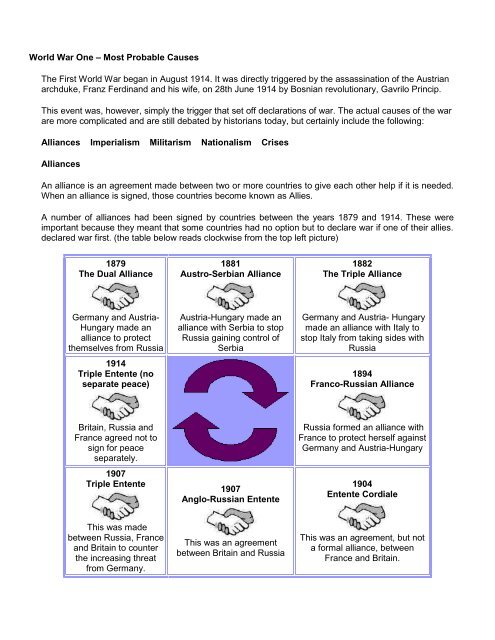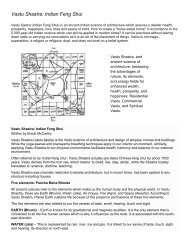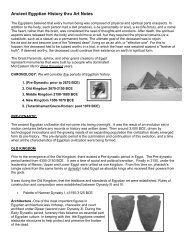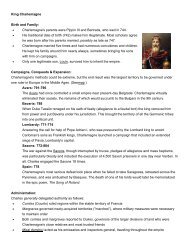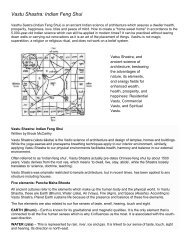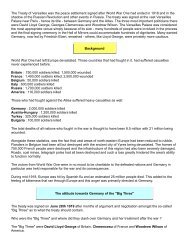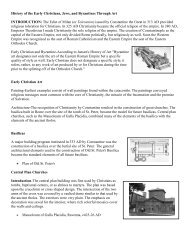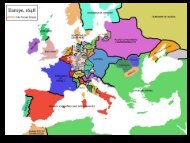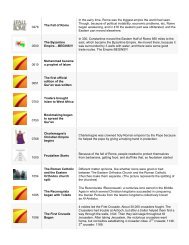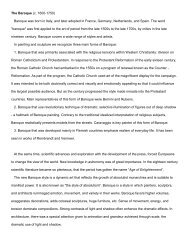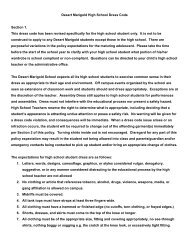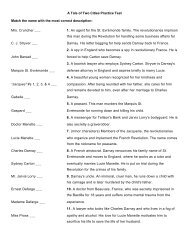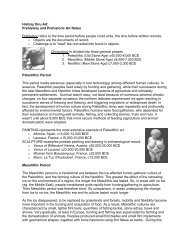World War One.pdf - DMHScommunity
World War One.pdf - DMHScommunity
World War One.pdf - DMHScommunity
You also want an ePaper? Increase the reach of your titles
YUMPU automatically turns print PDFs into web optimized ePapers that Google loves.
<strong>World</strong> <strong>War</strong> <strong>One</strong> – Most Probable Causes<br />
The First <strong>World</strong> <strong>War</strong> began in August 1914. It was directly triggered by the assassination of the Austrian<br />
archduke, Franz Ferdinand and his wife, on 28th June 1914 by Bosnian revolutionary, Gavrilo Princip.<br />
This event was, however, simply the trigger that set off declarations of war. The actual causes of the war<br />
are more complicated and are still debated by historians today, but certainly include the following:<br />
Alliances Imperialism Militarism Nationalism Crises<br />
Alliances<br />
An alliance is an agreement made between two or more countries to give each other help if it is needed.<br />
When an alliance is signed, those countries become known as Allies.<br />
A number of alliances had been signed by countries between the years 1879 and 1914. These were<br />
important because they meant that some countries had no option but to declare war if one of their allies.<br />
declared war first. (the table below reads clockwise from the top left picture)<br />
1879<br />
The Dual Alliance<br />
1881<br />
Austro-Serbian Alliance<br />
1882<br />
The Triple Alliance<br />
Germany and Austria-<br />
Hungary made an<br />
alliance to protect<br />
themselves from Russia<br />
1914<br />
Triple Entente (no<br />
separate peace)<br />
Austria-Hungary made an<br />
alliance with Serbia to stop<br />
Russia gaining control of<br />
Serbia<br />
Germany and Austria- Hungary<br />
made an alliance with Italy to<br />
stop Italy from taking sides with<br />
Russia<br />
1894<br />
Franco-Russian Alliance<br />
Britain, Russia and<br />
France agreed not to<br />
sign for peace<br />
separately.<br />
1907<br />
Triple Entente<br />
1907<br />
Anglo-Russian Entente<br />
Russia formed an alliance with<br />
France to protect herself against<br />
Germany and Austria-Hungary<br />
1904<br />
Entente Cordiale<br />
This was made<br />
between Russia, France<br />
and Britain to counter<br />
the increasing threat<br />
from Germany.<br />
This was an agreement<br />
between Britain and Russia<br />
This was an agreement, but not<br />
a formal alliance, between<br />
France and Britain.
Imperialism<br />
Imperialism is when a country takes over new lands or countries and makes them subject to their rule.<br />
By 1900 the British Empire extended over five continents and France had control of large areas of Africa.<br />
With the rise of industrialism countries needed new markets. The amount of lands 'owned' by Britain and<br />
France increased the rivalry with Germany who had entered the scramble to acquire colonies late and<br />
only had small areas of Africa. Note the contrast in the map below.<br />
Militarism<br />
Militarism means that the army and military forces are given a high profile by the government. The<br />
growing European divide had led to an arms race between the main countries. The armies of both<br />
France and Germany had more than doubled between 1870 and 1914 and there was fierce competition<br />
between Britain and Germany for mastery of the seas. The British had introduced the 'Dreadnought', an<br />
effective battleship, in 1906. The Germans soon followed suit introducing their own battleships. The<br />
German, Von Schlieffen also drew up a plan of action that involved attacking France through Belgium if<br />
Russia made an attack on Germany. The map below shows how the plan was to work.
Von Schlieffen’s Plan<br />
Nationalism<br />
Nationalism means being a strong supporter of the rights and interests of one's country. The Congress<br />
of Vienna, held after Napoleon's exile to Elba, aimed to sort out problems in Europe. Delegates from<br />
Britain, Austria, Prussia and Russia (the winning allies) decided upon a new Europe that left both<br />
Germany and Italy as divided states. Strong nationalist elements led to the re-unification of Italy in 1861<br />
and Germany in 1871. The settlement at the end of the Franco-Prussian war left France angry at the<br />
loss of Alsace-Lorraine to Germany and keen to regain their lost territory. Large areas of both Austria-<br />
Hungary and Serbia were home to differing nationalist groups, all of whom wanted freedom from the<br />
states in which they lived.<br />
Crises<br />
Moroccan Crisis<br />
In 1904 Morocco had been given to France by Britain, but the Moroccans wanted their independence. In<br />
1905, Germany announced her support for Moroccan independence. <strong>War</strong> was narrowly avoided by a<br />
conference which allowed France to retain possession of Morocco. However, in 1911, the Germans were<br />
again protesting against French possession of Morocco. Britain supported France and Germany was<br />
persuaded to back down for part of French Congo.<br />
Bosnian Crisis<br />
In 1908, Austria-Hungary took over the former Turkish province of Bosnia. This angered Serbians who<br />
felt the province should be theirs. Serbia threatened Austria-Hungary with war, Russia, allied to Serbia,<br />
mobilized its forces. Germany, allied to Austria-Hungary mobilized its forces and prepared to threaten<br />
Russia. <strong>War</strong> was avoided when Russia backed down. There was, however, war in the Balkans between<br />
1911 and 1912 when the Balkan states drove Turkey out of the area. The states then fought each other<br />
over which area should belong to which state. Austria-Hungary then intervened and forced Serbia to give<br />
up some of its acquisitions. Tension between Serbia and Austria-Hungary was high.


